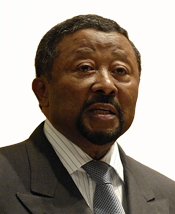- Why the West Want the Fall of Muammar Gaddafi (Analysis by Jean-Paul Pougala, 04, 2011)
- Wikileaks Cablegate reveals unflattering U.S. view of African ‘client states,’ leaders (FCN, 12-09-2010)

(FinalCall.com) – Dr. Jean Ping, chairperson of the African Union Commission, and his high level delegation recently paid an official visit to the United States.
The AUC chairman’s visit was part of the framework of the Second African Union/United States Dialogue that occurred April 20-21 in Washington, D.C. But his visit also included other meetings and discussions outside of the nation’s capitol.
The Dialogue discussion included talks about Peace and Security, Democracy, Governance and Human Rights, the AU’s Role in Strengthening Democratic Institutions, Education, Youth Development and Empowerment and Health.

At a meeting at the U.S. Institute of Peace–one of several locations visited by Dr. Ping–the official highlighted several African Union concerns, including the continent-wide organization’s most challenging undertaking–the effort to resolve civil war taking place in Libya.
Showing the frustrated nature of trying to work out a peace agreement when parties at the table come with “pre-conditions,” Dr. Ping said, “We called the UN, we called the Arab League, we called the Organization of Islamic Conference, we called the European Union to follow with us the technical arrangements concerning the ceasefire.” This was a clear reference to the AU being told that peace negotiations had to include the removal of Col. Muammar Gadhafi, Libya’s longtime revolutionary leader.
Stressing the challenge of dealing with rebel forces and Western powers aligned with the anti-Gadhafi Transitional National Conference (TNC), including the U.S. and EU, in peacemaking efforts, Dr. Ping said, “some are still asking for preconditions.”
A question that was not raised publicly, but that might have been raised by Dr. Ping during the private meeting between the AU chairman and U.S. Secretary of State Hillary Clinton may have been how can the U.S and the EU inject stipulations into peace negotiations?
The fact is if the U.S. and EU removed the preconditions, the TNC would more than likely follow suit, especially if the right pressure from its Western supporters was applied.
Another question that could have been raised during the private session: Why is the U.S. calling for regime change despite the negative effect the push to oust Gadhafi is having on the peace process? This regime change demand obviously proves disastrous, leaving a stalemate with Gadhafi’s support among a large percentage of the Libyan population and the outright Western desire for the Libyan leader’s political and physical demise.
The U.S. and the EU appear to be deliberately hurting any possible peace process and ignoring what having peace negotiations without preconditions could mean for the safety of Libyan civilians and the stability of the country.
Prior to holding the April 21 session in Washington, D.C. with Dr. Ping, Mrs. Clinton told the media, “We seek the African Union’s assistance in arriving at a political solution in Libya.” But no political solution was worked out and there was no press briefing about the outcome of the discussions.
Another session hosted by U.S. Attorney General Eric Holder included AU commissioners in an effort to underscore the U.S. government’s “commitment to Africa,” particularly efforts to promote rule of law and combat transitional crime.
During the session, the attorney general said, “We are continuing to solidify law enforcement cooperation between the United States and the African Union, especially in the areas of counternarcotics, and the combating of terrorism, piracy, and organized crime.”
Dr. Ping began his U.S. visit April 15 with other international leaders to officially launch the Inter-Regional Dialogue on Democracy.
While in D.C. he met with Congressional Black Caucus member Bobby Rush (D-Ill.), with whom he discussed issues related to the African Diaspora and the run-up to a proposed Diaspora Summit to possibly take place in Chicago next year.
Also included in the AU chair’s visit to the U.S. was participation in a roundtable discussion on Sudan Debt, which included the International Monetary Fund, the World Bank, and representatives of the AU High-Level Implementation Panel for Sudan, led by former South African President Thabo Mbeki.
The AU chairman visited Atlanta, where he visited the King Center and paid tribute to Dr. Martin Luther King, Jr., and Coretta Scott King. He worshiped Sunday, April 17, at Ebenezer Baptist Church–the church once pastored by Dr. King.
The following day in Atlanta, Dr. Ping visited Clark University, Morehouse College, two historically Black institutions of higher learning.
(Jehron Muhammad can be reached at [email protected].)
Related news:
Ten reasons why the U.S. war in Libya is a CIA operation (FCN, 04-28-2011)
Why the West Want the Fall of Muammar Gaddafi (Analysis by Jean-Paul Pougala, 04, 2011)
West ‘getting away with murder’ in Libya (FCN, 04-27-2011)
Farrakhan Questioned on Libya (WPFWRadio Interview, 04-03-2011)
Libya, Getting it Right: A Revolutionary Pan-African Perspective (FCN, 03-08-2011)
Wikileaks Cablegate reveals unflattering U.S. view of African ‘client states,’ leaders (FCN, 12-09-2010)
How the U.S. Government destabilized foreign governments (FCN, 07-22-1985)












